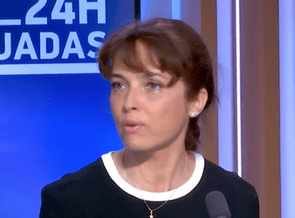Jeff Daniels with Reuters – Ukraine said on Sunday that renewed Russian shelling had damaged three radiation sensors and hurt a worker at the Zaporizhzhia power plant, in the second hit in consecutive days on Europe’s largest nuclear facility.
Ukrainian President Volodymyr Zelenskiy called Saturday night’s shelling “Russian nuclear terror” that warranted more international sanctions, this time on Moscow’s nuclear sector. Kyiv said Russia hit a power line at the plant on Friday.
However, the Russian-installed authority of the area said Ukraine hit the site with a multiple rocket launcher, damaging administrative buildings and an area near a storage facility.
Events at the Zaporizhzhia site have alarmed the world.
“(It) underlines the very real risk of a nuclear disaster,” International Atomic Energy Agency head Rafael Mariano Grossi warned on Saturday.

Emmanuelle Galichet
Emmanuelle Galichet, a French expert on nuclear risks, specified the risks to franceinfo: ” Without electricity, it is not possible to run the primary circuit of the reactor building which allows the heat to be evacuated. This is what happened in Fukushima, for example… In each plant, you have a large pool of water where the spent fuel is stored, until the radioactivity decreases. The main risk would be that there is no more water in these pools.”
Before the start of the Russian invasion, with its six reactors on a Ukrainian nuclear fleet which includes fifteen, Zaporizhia produced nearly a quarter of Ukraine’s electricity, said Teva Meyer, lecturer at the University of Haute-Alsace, a specialist in nuclear geopolitics, interviewed by franceinfo.
Elsewhere, a deal to unblock Ukraine’s food exports and ease global shortages gathered pace as another four ships sailed out of Ukrainian Black Sea ports while the first cargo vessel since Russia’s Feb. 24 invasion docked.
The four outgoing ships had almost 170,000 tonnes of corn and other food. They were sailing under a deal brokered by the United Nations and Turkey to try to help ease soaring global food prices that have resulted from the war.
Before Moscow’s Feb. 24 invasion, which Russian President Vladimir Putin calls a “special military operation”, Russia and Ukraine together accounted for nearly a third of global wheat exports. The disruption since then has threatened famine in some parts of the world.
BATTLE FOR DONBAS CONTINUES
Putin’s troops are trying to gain full control of the Donbas region of east Ukraine where pro-Moscow separatists seized territory after the Kremlin annexed Crimea to the south in 2014.
Russian forces stepped up their attacks north and northwest of Donetsk city in the Donbas on Sunday, Ukraine’s military said. The Russians attacked Ukrainian positions near the heavily fortified settlements of Piski and Avdiivka, as well as shelling other locations in the Donetsk region, it said.
Kyiv also says Russia is massing troops in southern Ukraine to prevent a potential counter-offensive near Kherson.
Ukraine’s chief war crimes prosecutor said almost 26,000 suspected war crimes committed since the invasion were being investigated, with 135 people charged, of whom 15 were in custody. Russia denies targeting civilians.
And after days of controversy, Amnesty International apologised for “distress and anger” caused by a report accusing Ukraine of endangering civilians. That had infuriated Zelenskiy and prompted the head of the rights group’s Ukraine office to resign.
FILE PHOTO: Surveillance camera footage shows a flare landing at the Zaporizhzhia nuclear power plant during shelling in Enerhodar, Zaporizhia Oblast, Ukraine March 4, 2022, in this screengrab from a video obtained from social media. Zaporizhzhya NPP via YouTube/via REUTERS


